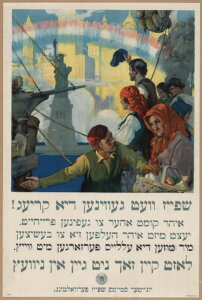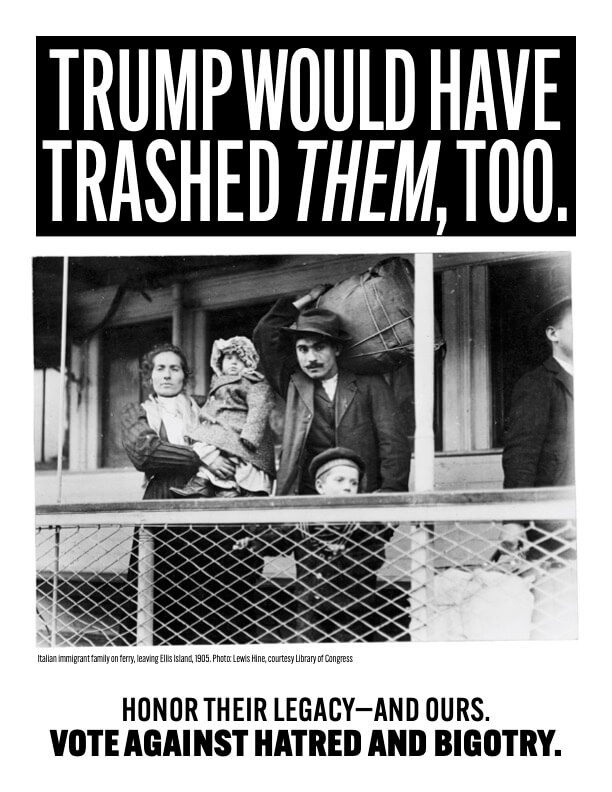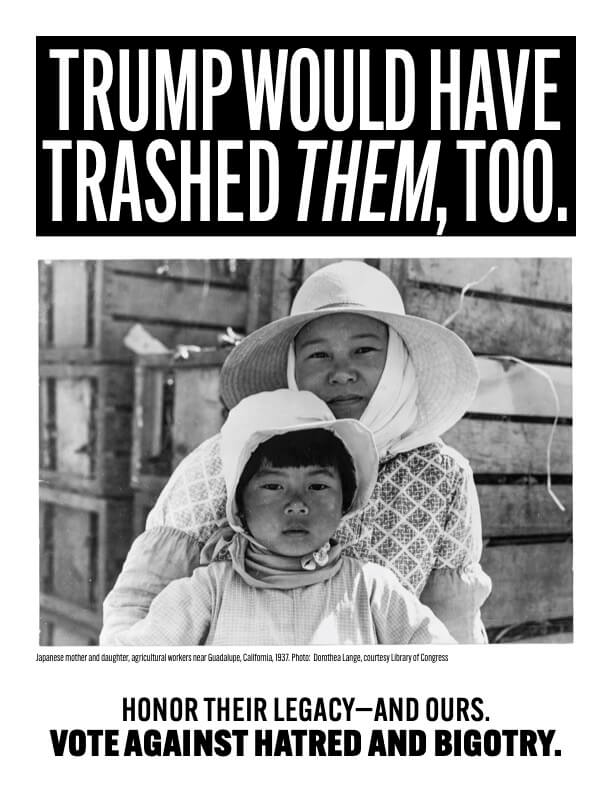A collage of posters on immigration history conceptualized by the author. Image by Andy Outis/Studio7 / collage by Jake Wasserman
The author made these posters in honor of his immigrant grandparents, using photographs from the Library of Congress and working with Andy Outis of Shift7 Studio.
When former President Donald Trump describes immigrants as “garbage” or “vermin,” my third thought is of the ugly strains of nativism and intolerance that have always polluted America’s bloodstream. My second is of Trump’s general loathsomeness. My first, though, is of Yosef Margolick, Chena Silver, Max Shragowitz and Rebecca Ribner.
They’re my grandparents. They, and millions like them, really did help make America great once upon a time. They were Jewish immigrants from Eastern Europe, and I’ve no doubt that had Trump been around in their day, he’d have called them all of the same names. And had herds of hyenas like the ones in Madison Square Garden the other night cheering him on.
Like many, I’ve always been conscious, and proud, of my immigrant roots. I, too, can recite Emma Lazarus’s famous words on the base of the Statue of Liberty. When Ellis Island reopened, I quickly made a pilgrimage there. A Yiddish version of a United States Food Administration from World War I, showing awestruck immigrants on the deck of a ship entering New York harbor, hangs in my apartment. (It also came in many other languages.)

The idealized image on that poster — the passengers beheld a rainbow poised over lower Manhattan — belied the often grim reality they faced. All of the calumnies that Trump now throws at their successors —- that they are dirty and diseased, dishonest and parasitic —- were directed at these earlier generations of newcomers as well. At that, they were of course the lucky ones, arriving before ur-Trumps padlocked Emma Lazarus’s golden door. Jews were slaughtered in all of the places they left behind.
Trump’s sickening rhetoric inspired me to make a set of posters of my own. The goal was simple: to stress the humanity of the people who’ve come and still come here, and to elicit an additional measure of humanity from ourselves.
The photographs are from the collection of the Library of Congress, which catalogs the huddled masses arriving from all over the world —- Russia, Ireland, Eastern Europe, Africa, Italy, Mexico, China, Japan — and the productive lives they led once they got here. Andy Outis of Shift7 Studio did the graphic design incorporating my words above and below the photos.

I have also been disappointed by the Democrats’ failure to effectively strike back against Trump’s racist campaign. Sure, they quarreled with his specious claims of Haitians eating cats and dogs in Ohio. But so toxic has immigration become across the political spectrum that few politicians seem ready to defend it in any form. They should be pointing out the precious role it has played in our history and continues to play in so many American lives. Including my own: my 100-year-old mother’s devoted caretakers originally came from Bosnia and Germany.

The photographs in these posters were made by some of the greatest chroniclers of our past, including Lewis Hine, Dorothea Lange, Russell Lee, Arthur Rothstein, and Ben Shahn. Most were hired by a government foresighted enough to record its own history (including its sordid side), then to preserve it, then to place it in the public domain, easily downloadable.
Their photographs capture the whole gamut of the immigrant experience: the heroism and dignity, innocence and elation, determination and fear.

Together, they capture the America that Abel Meeropol described in “The House I Live In”: “a home for all God’s children.” Including Yosef Margolick, Chena Silver, Max Shragowitz and Rebecca Ribner.
Max and Rebecca, my mother’s parents, were from Minsk, Belarus, and Jadow, Poland. My grandmother had the distinction of coming into Ellis Island twice, eventually landing — thanks to Baron De Hirsch — in the agricultural hamlet of Chesterfield, Connecticut.
My father’s parents, Yosef and Chena, were from Libau (now Liepāja) in Latvia and Dorbyan (Darbanai) in Lithuania. They sailed first into Canada, and settled in Montreal. Only 40 years later, fleeing Canadian antisemitism, did my father come here.
In these last days of this torrid campaign, I lack the grit myself to knock on doors in Pennsylvania or Arizona. But maybe my posters will help pick off a few of those much-coveted undecideds, especially those who’d have heard foreign accents in their homes growing up.
And at least I’ll have stood up for my grandparents, and lots of other people’s, too.

I hope you appreciated this article. Before you move on, I wanted to ask you to support the Forward’s award-winning journalism during our High Holiday Monthly Donor Drive.
If you’ve turned to the Forward in the past 12 months to better understand the world around you, we hope you will support us with a gift now. Your support has a direct impact, giving us the resources we need to report from Israel and around the U.S., across college campuses, and wherever there is news of importance to American Jews.
Make a monthly or one-time gift and support Jewish journalism throughout 5785. The first six months of your monthly gift will be matched for twice the investment in independent Jewish journalism.
— Rachel Fishman Feddersen, Publisher and CEO
